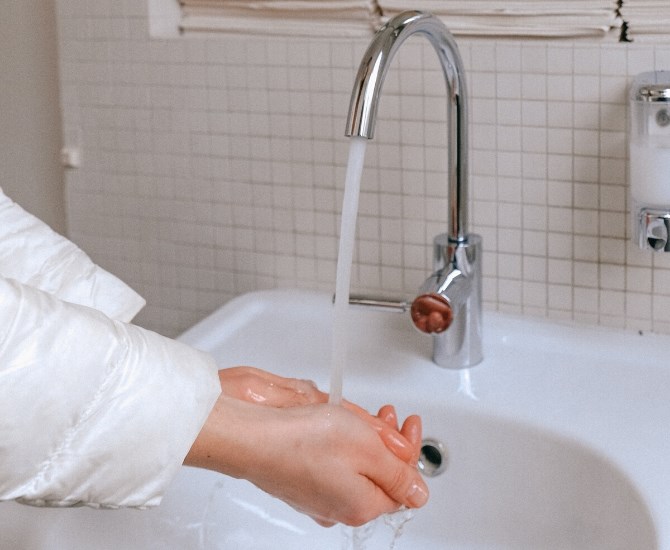
FILE PHOTO
Image Credit: PEXELS
May 04, 2020 - 6:30 AM
As a child, Pierre Frigon was always afraid that there was a ghost in his house. He would obsessively check each room for an hour before he went to bed, or else he wouldn’t be able to sleep.
As he got older his fears intensified, developing into germophobia and obsessive compulsive disorder.
"I never felt what I was doing was based on logic,” Frigon said. “It was more like a feeling.”
His anxiety led him to constantly wash his hands, take excessively long showers, and count the number of times he scrubbed until he reached fifty.
That was long before he got help to manage his symptoms, but he understands better than most how the added burden the COVID-19 pandemic is weighing on an estimated three million Canadians with anxiety or mood disorders.
Mark Antczak is a clinical counsellor with Anxiety Canada and says few will understand the toll the pandemic is taking on people with anxiety or Obsessive-Compulsive Disorder.
"We are having a big flare up of symptoms because we are living in pretty unprecedented times during the pandemic,” Antczak said.
OCD is characterized by excessive worrying and a need for control. Those struggling with the disorder will perform a variety of actions in an attempt to regain a sense of control, and prevent their fears from being realized.
"The OCD can latch onto very specific ways of getting a sense of certainty, when in reality we’re never actually able to get it,” Antczak said.
Within the context of the pandemic, these compulsions stem from a fear of catching COVID-19. Often, the actions taken to prevent this outcome are exacerbated safety measures, which can actually put the individual at a greater risk of harm.
"I heard a couple of instances where people are bleaching their produce, or boiling it for periods of time,” Antczak said. "People are really scrubbing their bodies to a point where it’s almost raw, and their hands or parts of their body are actually even cracking or bleeding.”
Not only does this excessive washing make anxiety worse, but it can lead to a risk of infection due to open wounds.
Frigon said it’s almost impossible to think logically when consumed by anxiety.
“You do these things because you feel better, not because you actually know it’s helping,” he said.
Frigon reached his breaking point with his disorder two years ago, and decided to seek help. Through therapy, he learned coping strategies which have enabled him to get through the pandemic without falling back into old habits.
“The biggest thing you have to do is become uncomfortable and start challenging yourself with facing your biggest fears,” he said. "Becoming more and more comfortable with being uncomfortable."
The isolation of the pandemic can make recovery particularly difficult.
“Right now for someone to be able to actively deal with (their OCD), especially if they’re in a really bad spot, could be tough,” Frigon said.
But isolation also presents a unique opportunity to tackle compulsive behaviours. While distractions of school and work can make living with anxiety easier, they can also distract from the need to seek help.
"They keep you at enough of a level where you don’t have to deal with your issues, but they’re still there,” he said.
One of the key components of recovering from an anxiety disorder is recognizing intrusive thoughts without acting on them, Antczak said.
"Like with all anxiety disorders, OCD is making people think that the threat of COVID is higher than it actually is,” he said. "We know anxiety is an overestimation of threat, and an underestimation of ability to cope.”
The first step in Frigon’s recovery was reducing the number of times he washed himself in the shower, until he forgot about counting altogether.
Over time, he realized that the threat of germs was significantly less than his disorder had led him to believe.
"It’s tough, and it takes a long time,” Frigon said.
“The important thing is to just keep fighting it no matter what, because it’s not a great way to live."
Anxiety Canada offers a free app to provide expert designed support and coping strategies for users struggling with anxiety.
Anyone experiencing an urgent mental health crisis can contact the B.C. CMHA crisis line 24/7 at 310-6789.
To contact a reporter for this story, email Brie Welton or call (250) 819-3723 or email the editor. You can also submit photos, videos or news tips to the newsroom and be entered to win a monthly prize draw.
We welcome your comments and opinions on our stories but play nice. We won't censor or delete comments unless they contain off-topic statements or links, unnecessary vulgarity, false facts, spam or obviously fake profiles. If you have any concerns about what you see in comments, email the editor in the link above.
News from © iNFOnews, 2020